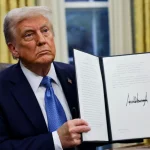
Chaos and Control: The Early Trump Presidency and the Threat to American Democracy
Posted in :
In the opening months of Donald Trump’s presidency, the country was thrust into a maelstrom of executive orders, legal battles, and public outrage. It had been less than 100 days, yet the landscape of American governance already appeared dramatically altered. For those watching closely, especially scholars like historian Heather Cox Richardson, it was clear that these early moments were not isolated missteps—they were part of a pattern signaling profound threats to democratic norms.
Trump’s entrance into office was met with both hope and trepidation, but the actions that quickly followed dispelled any belief that his administration would operate within conventional parameters. The rollout of a travel ban targeting several predominantly Muslim nations sparked airport protests across the country. Legal observers called it unconstitutional. Citizens saw it as a betrayal of American values. The administration saw it as bold leadership.
This tension became the hallmark of his early presidency. Rapid, often unvetted executive actions challenged legal boundaries. The federal judiciary—an institution meant to provide balance—was publicly attacked for resisting presidential authority. When courts attempted to slow or block Trump’s orders, the response from the administration was not recalibration, but confrontation.
A particularly chilling moment came with the invocation of the Alien Enemies Act, a law dating back to 1798. Originally intended to address foreign threats in wartime, Trump used it to justify the deportation of Venezuelan nationals he claimed were tied to their government. There was no trial. No oversight. Just a declaration from the executive branch. Richardson and other historians immediately recognized the danger: if a president can define the threat, declare the war, and wield unchecked power over individuals on American soil, the framework of democratic rights begins to dissolve.
The strain extended beyond domestic affairs. Foreign relations took on a volatile, transactional tone. Traditional allies were pushed aside, long-standing international agreements questioned or abandoned. A diplomatic call with Australia turned combative. NATO’s significance was dismissed. These shifts reflected not just a break in policy, but a rupture in the norms of global leadership.
Internally, the machinery of government was under pressure. Agencies responsible for public safety, environmental protection, education, and justice were restructured or weakened. Oversight was rolled back. Staff were muzzled or replaced. As institutions were hollowed out, power consolidated around the executive.
All of this unfolded in full view of the American public, but the reactions were sharply divided. Supporters saw a president delivering on promises. Critics saw constitutional crises unfolding in real time. The media became both chronicler and target. As journalists worked to hold the administration accountable, Trump’s relentless attacks on the press cultivated distrust among his base, further eroding public confidence in objective reporting.
The judiciary, long considered a stabilizing force, faced an unprecedented test. Judges like James Boasberg found themselves ruling on executive actions designed to sidestep legal precedent. While some court decisions slowed the administration’s pace, the concern lingered: would the judiciary remain independent enough—and fast enough—to counter unchecked executive behavior?
The consequences of this era continue to reverberate. Policies made in haste had long-lasting implications. The normalization of attacks on legal institutions and democratic principles paved the way for future leaders to push even further. What was once controversial became precedent. What was once alarming became expected.
Historical context matters. The use of power during crisis, whether justified or not, leaves marks on governance. The Alien Enemies Act, the travel ban, the undermining of oversight—these were not just political tools. They were signals. Signals that our system of checks and balances is only as strong as the collective will to defend it.
The dismantling of government institutions under the guise of reform weakens the very structure of democratic accountability. When foreign policy becomes erratic and isolationist, it compromises the country’s position in the world. When executive orders bypass deliberation, and when dissent is labeled disloyalty, democracy begins to hollow out.
But history also teaches us that people can resist. Citizens, communities, and courts all have roles to play. Richardson reminds us that civic engagement, public resistance, and legal accountability are essential tools—not just reactions. They are the mechanisms by which a democracy is defended from within.
The early days of the Trump administration offer more than a political retrospective. They are a lesson in how fast things can change—and how fragile democratic systems can be when power is unchecked. Complacency is not a defense. Informed, active engagement is the only way to ensure that democracy does not become a memory.

